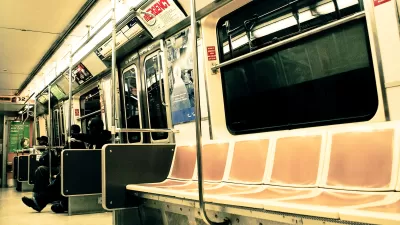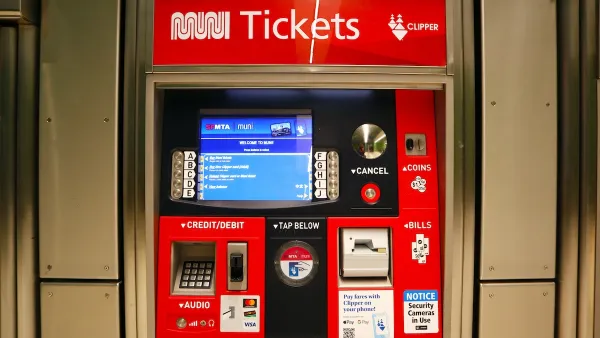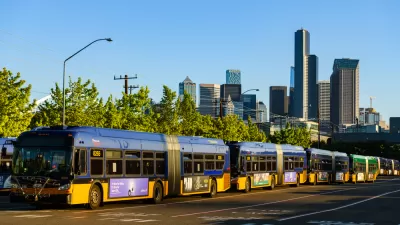The realities of the coronavirus are most obvious in the declining ridership, and revenues, on public transit in the United States, but it's not enough to shut down public transit when so many people depend on safe, healthy service.

TransitCenter has produced analysis about the ongoing effects of the coronavirus on public transit in the United States, producing a jaw-dropping estimate for the amount of money transit agencies will come fall short of expected revenue for the year given the reduced number of riders on public transit—despite the critical role of public transit in the public health crisis.
Among the millions of people still relying on public transit, according to the post, are "Health care workers going to and from their shifts; cleaners, warehouse staff, and food workers reporting to their jobs; utility employees; heads of household making trips to grocery stores and pharmacies."
The need for continued public transit service is challenged by the risk of close proximity among infected people. Cutting service or shutting down operations isn't an option: "Public transit agencies cannot weather this crisis through cuts. In order to maintain proper social distancing, transit agencies must operate enough service so that riders are not subject to crowded vehicles."
In that context, TransitCenter for the first time estimates the amount of revenue transit agencies are likely to miss out on in 2020, coming up with two figures: $26 billion or $38 billion. So far in the developing crisis, numerous transit agencies have made specific requests to Congress for more than $1 billion in emergency relief, and the American Public Transit Association (APTA) made a request for $12.9 billion in relief from the federal government, as reported by Planetizen last week.
The TransitCenter analysis also provides "snapshots of current impacts on local agencies" and "two scenarios outlining the potential cumulative impact on transit agencies nationwide." Those two scenarios represent the low- and the high-end estimates at either side of the $26 billion and $38 billion figures mentioned above.
FULL STORY: Estimated Financial Impact of COVID-19 on U.S. Transit Agencies: $26-$38 Billion Annually

Maui's Vacation Rental Debate Turns Ugly
Verbal attacks, misinformation campaigns and fistfights plague a high-stakes debate to convert thousands of vacation rentals into long-term housing.

Planetizen Federal Action Tracker
A weekly monitor of how Trump’s orders and actions are impacting planners and planning in America.

In Urban Planning, AI Prompting Could be the New Design Thinking
Creativity has long been key to great urban design. What if we see AI as our new creative partner?

King County Supportive Housing Program Offers Hope for Unhoused Residents
The county is taking a ‘Housing First’ approach that prioritizes getting people into housing, then offering wraparound supportive services.

Researchers Use AI to Get Clearer Picture of US Housing
Analysts are using artificial intelligence to supercharge their research by allowing them to comb through data faster. Though these AI tools can be error prone, they save time and housing researchers are optimistic about the future.

Making Shared Micromobility More Inclusive
Cities and shared mobility system operators can do more to include people with disabilities in planning and operations, per a new report.
Urban Design for Planners 1: Software Tools
This six-course series explores essential urban design concepts using open source software and equips planners with the tools they need to participate fully in the urban design process.
Planning for Universal Design
Learn the tools for implementing Universal Design in planning regulations.
planning NEXT
Appalachian Highlands Housing Partners
Mpact (founded as Rail~Volution)
City of Camden Redevelopment Agency
City of Astoria
City of Portland
City of Laramie





























